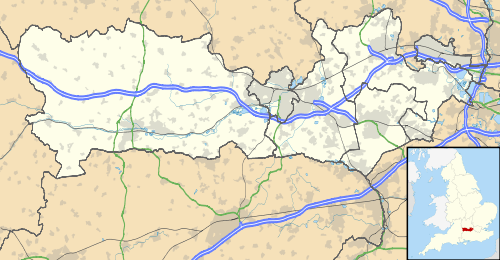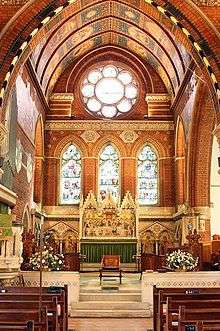Ascot, Berkshire
Ascot /ˈæskət/ is a small town in East Berkshire, England, 6 miles (9.7 km) south of Windsor, 4 miles (6.4 km) east of Bracknell and 25 miles (40 km) west of London.[1] It is most notable as the location of Ascot Racecourse, home of the Royal Ascot meeting, and is reportedly the 13th most expensive town in England when taking into account the average house price.[2] It is also among the ten most expensive towns in Britain to rent a property.[3] The town comprises three areas: Ascot itself, North Ascot and South Ascot. It is in the civil parish of Sunninghill and Ascot.
| Ascot | |
|---|---|
 High Street, Ascot | |
 Ascot Location within Berkshire | |
| Population | 11,603 (2001 Census; with Sunninghill) |
| OS grid reference | SU925685 |
| Civil parish | |
| Unitary authority | |
| Ceremonial county | |
| Region | |
| Country | England |
| Sovereign state | United Kingdom |
| Post town | Ascot |
| Postcode district | SL5 |
| Dialling code | 01344 |
| Police | Thames Valley |
| Fire | Royal Berkshire |
| Ambulance | South Central |
| UK Parliament | |
Etymology
The name ’Ascot’ derives from the Old English ēast (east) and cot (cottage).[4]
Governance
Ascot is in the district administered by the Royal Borough of Windsor and Maidenhead, a unitary authority. Ascot, South Ascot and a small part of North Ascot are in the civil parish of Sunninghill and Ascot, although most of North Ascot is in the civil parish of Winkfield, in the district of Bracknell Forest.

Churches
Church of England
The Church of England parish church of All Saints, Ascot Heath is a red brick Gothic Revival building designed by T.H. Rushforth and built in 1864.[5] It has a richly decorated interior. The east window of its chancel is a Jesse window with stained glass made by C.E. Kempe & Co in 1907.[5] Above it is a rose window by Hardman & Co.[5]
The Church of England parish church of All Souls, South Ascot is another red-brick Gothic Revival building. It was designed by J.L. Pearson and built in 1896–97.[5] It has a central tower with a pyramidal roof. Its nave has aisles of four bays.[5] The ceilings of the chancel, baptistery and the crossing under the tower are rib vaulted.[5] All Souls' is a Grade II* listed building.[6]
Ascot Priory was founded in 1861 for the Society of the Most Holy Trinity.[5] It has buildings designed by the architects Charles Buckeridge, William Butterfield, George Gilbert Scott and Leonard Stokes.[5]
Roman Catholic
The Roman Catholic church of St Francis is also a red-brick Gothic Revival building.[5] It was designed by the Roman Catholic priest and architect A.J.C. Scoles, built in 1889 and has an apsidal chancel.[5]
Local schools
Independent senior schools in the area include Heathfield School (an all girls boarding school), St. George's School (a private girls senior school recently attended by Princess Beatrice of York), St Mary's School, Ascot, a Catholic all-girls boarding school (which Caroline, Princess of Hanover attended), located in South Ascot and the Licensed Victuallers' School, which is located down the road from Ascot Racecourse. Papplewick is also based in Ascot. The local state secondary school in the Ascot area is Charters School in nearby Sunningdale, which received a 'Grade 1 Outstanding' assessment from the Schools watchdog Ofsted in 2009.
Amenities
Facilities tend to be geared towards the racecourse, but there is a small range of shops in the wide High Street. Most of the expected facilities one would expect to find in a small town are here, including a supermarket, petrol station and many cafes (including a Starbucks and a Costa, a Subway, Tesco Express and Sainsbury Local). Most buildings are post-war with flats above the ground floor retail space. Heatherwood Hospital (filming location for Carry on Matron) was at the western edge of the town. Ascot has a station on a bisection of the railway line from London Waterloo to Reading, Bagshot, Aldershot and Guildford, originally built by the London & South Western Railway and now operated by South Western Railway. As a consequence of the frequent service on this line, Ascot is now a commuter centre with its residents in both directions (westwards to Reading and eastwards to London).
Royal Ascot week
The centrepiece of Ascot's year is held in June: Royal Ascot is arguably the world's most famous race meeting, steeped in history dating back to 1711. The royal family attend the meeting, arriving each day in a procession of horse-drawn carriages from Windsor Castle through the great park and the village of Cheapside. It is a major event in the British social calendar. Although this has placed Ascot onto the British social map, it has many direct effects on the local community, not least of which are the associated traffic problems. The course is still owned by the Crown.
Economy
Ascot Racecourse employs over 70 full-time staff, which increases temporarily to 6,000 during Royal Ascot week. The village has a variety of businesses located at the Ascot Business Park, opened in 2008, including the UK headquarters of global toy manufacturer Jakks Pacific, in addition to numerous small and medium enterprises. The Chartered Institute of Building, a professional body for those working in the construction industry and built environment, is also based in Ascot.
Sport and leisure
Ascot has a Non-League football club, Ascot United F.C., and a cricket club, Royal Ascot Cricket Club which play at Ascot Racecourse.
Army Cadet Force
Ascot also has an Army Cadet Force unit, called 4 Platoon Ascot. The unit, being badged as Irish Guards (due to the unit belonging to A Company, Berkshire ACF; a company currently badged to the Household Division), means that the unit regularly sees Irish Guards events such as the St. Patrick's Day Parade, and even has the privilege of taking part in an Irish Guards ACF skills competition, run by the battalion. It parades at 19:15 until 21:30 on a Monday and Wednesday night at Sunningdale Parish Hall and actively recruits from the local and surrounding area. The unit used to parade at Ascot Racecourse, however they were evicted due to an appeal made by the racecourse owners. They now temporarily parade at Sunningdale Parish Hall, Broomhill Lane. The unit now has a new Detachment Commander.
Notable residents
- Boris Berezovsky, an exiled Russian tycoon, lived and died in Ascot.
- Josh Cuthbert, singer from Union J
- Sarah Harding, singer, Girls Aloud, born in Ascot
- John Lennon and Ringo Starr of The Beatles, successively lived at Tittenhurst Park, Ascot
- Camilla Luddington, actress, born and raised in Ascot
- Marti Pellow, singer of Wet Wet Wet, lives in Ascot
- Adam Roberts, science fiction author, lives in North Ascot.
- Chris Evans, English presenter, businessman and producer for radio and television, lives in Ascot.
References
- "Independent, 17 June 2011". Archived from the original on 6 September 2017. Retrieved 19 September 2017.
- Scott, Patrick (11 August 2016). "Revealed: The most expensive towns - and streets - in England". mirror. Archived from the original on 3 March 2018. Retrieved 5 September 2017.
- Osborne, Hilary (30 April 2015). "Revealed: Britain's most expensive places to rent a home". The Guardian. ISSN 0261-3077. Archived from the original on 6 September 2017. Retrieved 5 September 2017.
- Field, John (1980). Place-names of Great Britain and Ireland. Newton Abbot, Devon: David & Charles. p. 26. ISBN 0389201545. OCLC 6964610.
- Pevsner 1966, p. 68
- Historic England (3 March 1972). "Church of All Souls (1119809)". National Heritage List for England. Retrieved 22 July 2013.
Sources and further reading
- Ditchfield, P.H.; Page, W.H., eds. (1923). A History of the County of Berkshire, Volume 3. Victoria County History. pp. 134–136.CS1 maint: ref=harv (link)
- Pevsner, Nikolaus (1966). Berkshire. The Buildings of England. Harmondsworth: Penguin Books. pp. 68–70.CS1 maint: ref=harv (link)
External links
| Wikivoyage has a travel guide for Ascot (England). |
| Wikimedia Commons has media related to Ascot, Berkshire. |